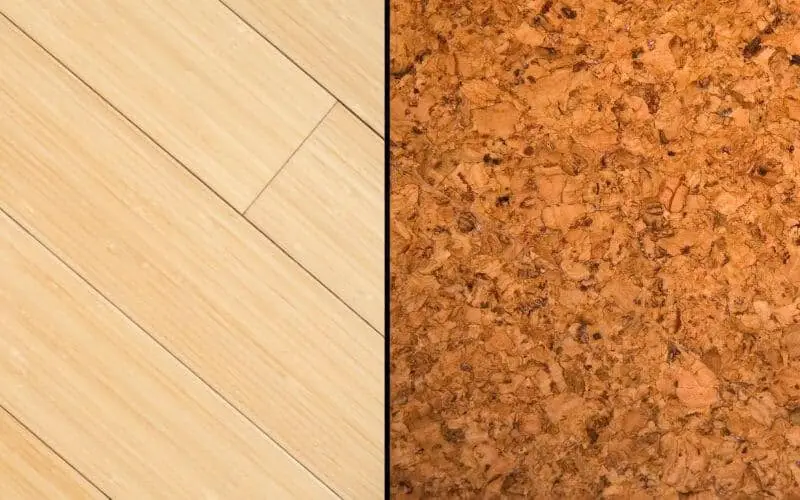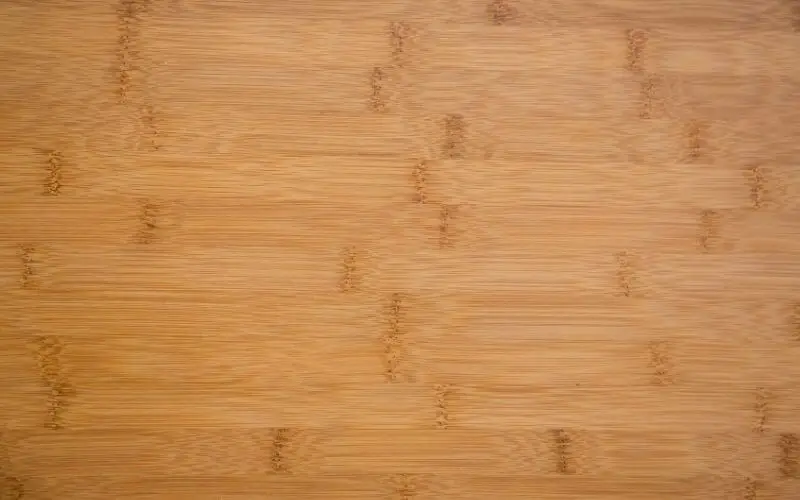If you are embarking on a house improvement project, when it comes to flooring, you are mostly presented with two options: Cork vs bamboo flooring.
This is because preferences have shifted from hardwoods which were the gold standard for bare flooring, to either cork or bamboo flooring.
Admittedly, both cork and bamboo flooring are great sustainable, eco-friendly options. However, there are salient differences between both of them.
For instance, in terms of durability, bamboo flooring is more durable than cork flooring. In contrast, cork is naturally resistant to water.
However, choosing between both floorings essentially boils them to personal preference. This post will highlight some of the noticeable differences between both flooring and their pros and cons.
This will help you arrive at the best beautiful flooring option for your next home improvement project.
Related: Pros and Cons of Cork Flooring
Cork Vs Bamboo Flooring
Table of Contents
As mentioned earlier, both cork and bamboo flooring are great alternatives to traditional hardwood. However, both floorings have some subtle differences that might be a better option for you based on your preference and needs.
1. Durability
When presented with both options, cork vs bamboo flooring, you might want to assess the durability of both floorings.
If you are embarking on a permanent house improvement project, it makes more sense to go with bamboo flooring.
This is because bamboo flooring is highly durable and can hold up weights, just like solid hardwoods. However, just like hardwoods, bamboo flooring is susceptible to scratches and dents from furniture legs, high heel shoes, pet claws, etc.
You can adopt some protective measures to prevent this from happening, like adding protectors to the leg of furniture, trimming pet nails, and removing your shoes while walking on floors.
Generally, cork floorings are less durable. Thus, if you are embarking on a permanent house improvement project, cork flooring might not exactly be the best option.
Cork floorings are made of soft materials and thus cannot hold up weights. Heavy objects such as furniture can cause denting to occur, and it’s even more susceptible to scratches than bamboo flooring.
Overall, Bamboo flooring is the most durable when you compare it to cork.
Related: How durable is marble flooring
2. Water Resistance
One primary reason why hardwood is less popular is because hardwood can be damaged by water. As mentioned earlier, arriving at the best option between cork and bamboo flooring should be strictly based on your personal preference and need.
If you need flooring that can withstand a high humidity level, then cork flooring is your surest bet. Naturally, cork is highly resistant to mold and mildew, making it the perfect fit for places exposed to moisture like bathrooms, kitchens, and basements.
While bamboo flooring is slightly more resistant to water than solid hardwoods, its resistance level cannot be compared to cork floorings.
Thus, you should avoid installing bamboo flooring in wet or humid rooms. Also, avoid wet mopping bamboo flooring. Spills should be wiped up promptly as exposure to excessive moisture may result in warping, mold or mildew growth, or other damage.
In conclusion, if you’re looking for flooring that can be installed in moist spaces without becoming damaged, cork is the right option for you.
3. Lifespan
If you are embarking on a permanent house project that will stand the test of time, bamboo flooring is the best option for you!
Bamboo flooring can withstand lots of wear and tears and can last up to 50 years or even longer. This doesn’t mean that cork flooring will crumble in a short period. With proper care, most cork flooring can last 40 years or longer.
However, if you are interested in a more durable flooring with a longer life span, you may want to install bamboo flooring.
Related: What is the most durable hardwood floor
4. Price
As emphasized, your choice between both flooring options should be strictly based on your needs or preferences. We believe that before embarking on any house project, you must have drawn up a budget.
Depending on your budget, all indications point to the fact that cork flooring will definitely accommodate your budget if you need a more cost-effective option.
While there is no fixed price for flooring (the price is usually dependent on the quality and thickness of the flooring and the brand name), you may discover that cork, more often than not, is cheaper than bamboo flooring.
Averagely, bamboo flooring is usually purchased at $5 to $7 per square foot in most stores, while cork flooring is between $3 to $5 per square foot, making cork flooring a more affordable option.
5. Price for Professional Installation
Your budget should play a role in determining the type of flooring option you choose. While the price of the new flooring should be considered, you’ll need to calculate the cost of installation as well unless you decide to install it yourself.
From all indications, it may seem that the professional installation of bamboo flooring is less expensive than cork flooring installation.
Most carpenters will charge you an average of $4 to $6 per square foot to install bamboo flooring, while cork flooring installation might be charged at around $5 to $7 per square foot.
Note that this is not a fixed price. Many factors will affect the cost of installation, such as the average rates in your region and the size and difficulty of the job. For instance, in some areas, a contractor will charge $9 or more per square foot.
6. Comfort
Your choice between both options should be based on your preference; thus, if you prefer a softer flooring which is comfortable to stand on, then cork flooring is your best bet.
When it comes to comfort, most homeowners find themselves edging towards cork flooring. This is because cork flooring is soft and has a cushioned feel, making it easier to walk on.
Cork also has heat and sound insulating properties, and thus, it stays warm in the winter and cools in the summer.
Bamboo flooring is not exactly popular for its comfortability. Just like hardwoods, bamboo flooring is hard and also gets cold during the winter.
This may be prevented by installing an underfloor heating system to warm up floors during winter, but this can cost several thousand dollars.
Conclusively, cork flooring has a more cushioned feel and insulating properties, making it the best if you’re more concerned about your comfort.
7. Cleaning
Your choice between the two flooring options should also be based on how easy they are to clean. We are pretty sure that you don’t want to spend hours cleaning the floors, which necessitates the need for you to go with a flooring that is easier to clean.
For both floorings, you can use brooms, dust mops, or vacuum cleaners to clean them. However, as mentioned earlier, cork is more resistant to water. Thus, you can wet mop or steam mop cork flooring without damaging it.
You should avoid wet or steam mopping for bamboo flooring as it is more susceptible to damage from excessive moisture and humidity.
Read: How to make bamboo floors shine
Similarities Between Cork Flooring and Bamboo Flooring
While we have successfully highlighted the difference between both flooring options, remember that we mentioned that both flooring options share some similarities that make them a better alternative to solid hardwoods.
Both cork and bamboo are eco-friendly flooring options that give the home a beautiful appearance while making a minimal impact on the environment.
Most environmentally conscious consumers are shifting away from solid hardwoods because they are less sustainable than cork or bamboo flooring.
Hardwood trees take 30 to 1000 years to reach the proper maturity before they are harvested and replanted.
In contrast, bamboo reaches maturity in just 5 to seven years. It regrows roots another five to seven years after each harvest.
In the case of cork flooring, its material is obtained from wood bark which can be harvested without killing the tree.
Cork trees usually take about 25 years to reach maturity level. Once the bark is peeled away, it can regenerate on the live tree in nine to 12 years.
Related: How to clean bamboo floors with vinegar
Conclusion
Both cork and bamboo flooring are great options for you. However, the subtle difference between the two necessitates the question, cork vs bamboo flooring? Both flooring share similar similarities in terms of sustainability, durability, and aesthetic value.
In conclusion, if you need more durable flooring with a longer lifespan, then bamboo flooring is the right fit for you!
For flooring to be installed in humid rooms like the kitchen and bathroom, you should opt for the more water-resistant cork flooring!

